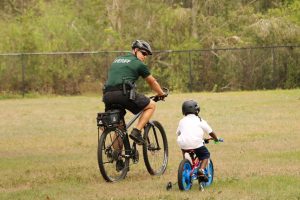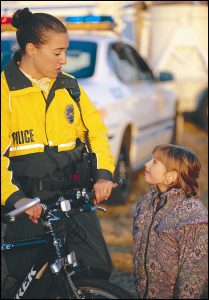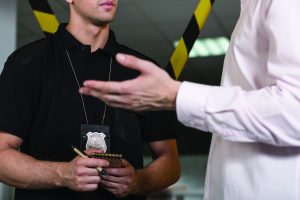Sworn law enforcement officers are those who have taken an oath to support the Constitution of the United States, their state, and the laws of their agency’s jurisdiction. Sworn officers also have the responsibility to ensure the safety and quality of life of the communities they serve. The basic duties and types of sworn law enforcement officers are summarized below.
The Nature of the Work
People depend on law enforcement officers protect their lives and property. Law enforcement officers, some of whom are state or federal special agents or inspectors, perform these duties in a variety of ways depending on the size and type of their organization.
Officers and detectives maintain a helpful presence in their communities. Most patrol their jurisdictions. They may coordinate traffic, visit local businesses, or respond to calls for assistance. A large proportion of their time is spent writing reports, maintaining records of incidents they encounter, and interacting with the communities as they conduct their daily activities. Detectives, who are often called agents or special agents, perform investigative duties such as gathering facts and collecting evidence.

The daily activities of police officers and detectives differ depending on their occupational specialty–such as police officer, game warden, or detective–and whether they are working for a local, state, or federal agency. Duties also differ substantially among various federal agencies. Regardless of job duties or location, police officers and detectives at all levels must write reports and maintain meticulous records.
Types of Careers
Uniformed police officers have general law enforcement duties, including maintaining regular patrols and responding to calls for service. Much of their time is spent responding to calls and doing paperwork. They may direct traffic at the scene of an accident, investigate a burglary, or give first aid to an accident victim. They are also responsible for building relationships with the residents of local neighborhoods. In large police departments, officers usually are assigned to a specific type of duty, such as bicycle patrol, foot patrol, etc.
Agencies are usually organized into geographic districts, with uniformed officers assigned to patrol a specific area such as part of the business district or outlying residential neighborhoods. Officers may work alone or with a partner. While on patrol, officers attempt to become thoroughly familiar with their patrol area, the community, and remain alert for anything unusual. Hazards to public safety are investigated or noted, and officers are dispatched to individual calls for assistance. During their shift, they may engage with the community; enforce laws; or issue warnings or citations.
Special jurisdiction police agencies have special geographic jurisdictions and responsibilities. Public college and university police forces, public school district police, and agencies serving transportation systems and facilities are examples. Most law enforcement workers in special agencies are uniformed officers; a smaller number are investigators.
Sheriffs and deputy sheriffs have jurisdiction on the county level. Sheriffs are usually elected to their posts and perform duties similar to those of a local or county police chief. Deputy sheriffs often have law enforcement duties similar to those of uniformed officers within police departments.
State police officers, sometimes called state troopers or highway patrol officers, patrol highways to enforce motor vehicle laws and regulations. State police officers often issue traffic warnings or citations to motorists. At the scene of collisions, they may direct traffic, give first aid, and call for emergency equipment. They also write reports used to determine the cause of the accident. State police officers are frequently called upon to provide comprehensive law enforcement services, especially in rural areas or small towns.
State law enforcement agencies operate in almost every state with the United States. Most full-time sworn personnel are uniformed officers who regularly patrol and respond to calls for service. Others work as investigators, perform court-related duties, or carry out administrative or other assignments.
 Specialized assignments are available after at least two years of regular patrol duties. Officers can specialize in a particular field, such as chemical and microscopic analysis, training and firearms instruction, or handwriting and fingerprint identification. Others work with special units, such as horseback, bicycle, motorcycle, or harbor patrol; canine corps; special weapons and tactics (SWAT); or emergency response teams. A few local and special law enforcement officers primarily perform jail-related duties or work in courts.
Specialized assignments are available after at least two years of regular patrol duties. Officers can specialize in a particular field, such as chemical and microscopic analysis, training and firearms instruction, or handwriting and fingerprint identification. Others work with special units, such as horseback, bicycle, motorcycle, or harbor patrol; canine corps; special weapons and tactics (SWAT); or emergency response teams. A few local and special law enforcement officers primarily perform jail-related duties or work in courts.
Detectives are plainclothes investigators who gather facts and collect evidence for criminal cases. Some are assigned to interagency task forces to combat specific types of crime. They conduct interviews, examine records, observe the activities of suspects, and participate in raids or arrests. Detectives and state and federal agents and inspectors usually specialize in investigating one type of violation, such as homicide or fraud. They are assigned cases on a rotating basis and work on them until an arrest and conviction is made or until the case is dropped.
Fish and game wardens enforce fishing, hunting, and boating laws. They patrol hunting and fishing areas, conduct search and rescue operations, investigate complaints and accidents, and aid in prosecuting court cases.
The U.S. Federal Government works in many areas of law enforcement. Federal  Bureau of Investigation (FBI) agents are the government’s principal investigators, responsible for investigating violations of more than 200 categories of federal law and conducting sensitive national security investigations. Agents may conduct surveillance, monitor court-authorized wiretaps, examine business records, investigate white-collar crime, or participate in sensitive undercover assignments. The FBI investigates a wide range of criminal activity, including organized crime, public corruption, financial crime, bank robbery, kidnapping, terrorism, espionage, drug trafficking, and cyber crime.
Bureau of Investigation (FBI) agents are the government’s principal investigators, responsible for investigating violations of more than 200 categories of federal law and conducting sensitive national security investigations. Agents may conduct surveillance, monitor court-authorized wiretaps, examine business records, investigate white-collar crime, or participate in sensitive undercover assignments. The FBI investigates a wide range of criminal activity, including organized crime, public corruption, financial crime, bank robbery, kidnapping, terrorism, espionage, drug trafficking, and cyber crime.
There are many other federal agencies that enforce particular types of laws. U.S. Drug Enforcement Administration (DEA) agents enforce laws and regulations relating to illegal drugs. U.S. Marshals and Deputy Marshals protect the federal courts and ensure the effective operation of the judicial system. Bureau of Alcohol, Tobacco, Firearms, and Explosives (ATF)agents enforce and investigate violations of federal firearms and explosives laws, as well as federal alcohol and tobacco tax regulations. The U.S. Department of State Bureau of Diplomatic Security special agents are engaged in the battle against terrorism.
The Department of Homeland Security also employs numerous law enforcement officers within several different agencies, including Customs and Border Protection, Immigration and Customs Enforcement, and the U.S. Secret Service. U.S. Border Patrol agents protect more than 8,000 miles of international land and water boundaries. Immigration inspectors interview and examine people seeking entrance to the United States and its territories. Customs inspectors enforce laws governing imports and exports by inspecting cargo, baggage, and articles worn or carried by people, vessels, vehicles, trains, and aircraft entering or leaving the United States. Federal Air Marshals provide air security by guarding against attacks targeting U.S. aircraft, passengers, and crews. U.S. Secret Service special agents and U.S. Secret Service uniformed officers protect the President, Vice President, their immediate families, and other public officials. Secret Service special agents also investigate counterfeiting, forgery of government checks or bonds, and fraudulent use of credit cards.
Other federal agencies employ police and special agents with sworn arrest powers and the authority to carry firearms. These agencies include the Postal Service, the Bureau of Indian Affairs Office of Law Enforcement, the Forest Service, and the National Park Service.
Source: Bureau of Labor Statistics, U.S. Department of Labor, Occupational Outlook Handbook, 2008-09 Edition, Police and Detectives.
